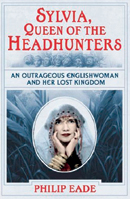Book review: Sylvia, Queen of the Headhunters
Hugh Massingberd is swept away by an engagingly told tale of the intriguing eccentric Sylvia Brooke, wife of the last British Rajah of Sarawak


Exquisite houses, the beauty of Nature, and how to get the most from your life, straight to your inbox.
You are now subscribed
Your newsletter sign-up was successful
Sylvia, Queen of the Headhunters: An Outrageous Englishwoman and Her Lost Kingdom
Philip Eade
(Weidenfeld & Nicolson, £20)
When I used to edit Burke's Landed Gentry, my favourite article was entitled 'Brooke of Sarawak', as if this jungly kingdom on the island of Borneo, which the family ruled for three generations, was a country estate. Indeed, the last Rajah, Sir Vyner Brooke, carried out his duties much in the manner of a benevolent English squire. In his entry in Who's Who, he noted of himself: 'Has led several expeditions into the far interior of the country to punish headhunters; understands the management of natives; rules over a population of 500,000 souls and a country of 40,000 sq miles in extent.'
Unfortunately, the Brooke Raj came to an end in 1946 when Sir Vyner ceded Sarawak to the British Crown, which thereby became Britain's last colonial acquisition. Many were inclined to blame the decay of the dynasty on the antics of the last Rajah's wife, Sylvia, styled Her Highness the Ranee of Sarawak, although by custom his 'slave' and obliged to walk four paces behind her husband. Mythomaniac, meddlesome intriguer and self-publicist (described in the press as 'this most charming of despots'), Sylvia (née Brett) had pretensions as an author among her oeuvre was an autobiography, Queen of the Headhunters. As her own father, the 2nd Viscount Esher, the Edwardian éminence grise, put it: 'Dignity does not enter into her scheme of life. 'Yet, to his credit, Philip Eade, although not deceived for a moment, treats his subject with sympathy, and portrays the poignancy beneath the preposterousness. For all Sylvia's absurdity, she was alive to the romance of Sarawak: 'The magic of it all possessed me, sight, sound and sense; there was in this abundant land everything for which my heart had yearned.'
In his first book, Mr Eade has uncovered a mine of marvellous material and handles it all with consummate wit and style. Indeed, this is a dazzling debut, and I could not recommend it more highly as the perfect summer holiday read. Virtually every page contains a delicious anecdote, eccentric character or subtle aside to savour. For example, as a boy, Vyner was forbidden to eat jam as his father deemed it 'effeminate'. The old Rajah deployed a variety of disconcerting false eyes, originally designed for stuffed birds of prey. His successor's peepers were mainly focused on scantily clad girls, even into his eighties, when the Television Toppers caught his fancy.
Sylvia did little to discourage the press dubbing her colourful daughters 'Princess Gold', 'Princess Pearl' and 'Princess Baba'. Her assortment of sons-in-law included 'the King of the Hot-Cha' (otherwise known as the bandleader Harry Roy) and an all-in wrestler called 'The Gable of Grapple'. As for the headhunting Dyaks, they had the proud record of lopping off 1,500 Japanese heads during the wartime occupation. Afterwards, they were keen to present one of them, the bespectacled cranium of a Japanese educationalist, to a British parliamentary delegation. 'They still kept the glasses on,' observed one MP, 'and took them off every day and wiped them.'
Exquisite houses, the beauty of Nature, and how to get the most from your life, straight to your inbox.
Country Life is unlike any other magazine: the only glossy weekly on the newsstand and the only magazine that has been guest-edited by His Majesty The King not once, but twice. It is a celebration of modern rural life and all its diverse joys and pleasures — that was first published in Queen Victoria's Diamond Jubilee year. Our eclectic mixture of witty and informative content — from the most up-to-date property news and commentary and a coveted glimpse inside some of the UK's best houses and gardens, to gardening, the arts and interior design, written by experts in their field — still cannot be found in print or online, anywhere else.
